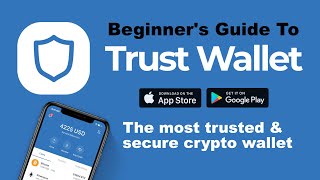In the ever-expanding world of cryptocurrency, managing and securing Trust wallet digital assets is one of the most critical aspects for users. Whether you are a novice or an experienced crypto enthusiast, choosing the right wallet for storing, sending, and receiving digital currencies is a top priority. Among the many wallets available today, Trust Wallet has emerged as one of the most popular and trusted options for millions of users worldwide.
This article will explore what Trust Wallet is, its features, supported cryptocurrencies, security measures, and how it compares to other wallet options. Let’s dive into what makes Trust Wallet a standout choice in the crypto world.
What is Trust Wallet?
Trust Wallet is a non-custodial mobile cryptocurrency wallet that allows users to store, send, receive, and manage various cryptocurrencies and tokens on a secure platform. Unlike traditional wallets, which store private keys on a server controlled by a third party, Trust Wallet gives users full control over their private keys. This means that users remain the sole owners of their funds, eliminating the need for intermediaries and ensuring greater security.
Trust Wallet was acquired by Binance in 2018 but remains independent in terms of functionality and operations. It is available as a free-to-download app for both Android and iOS devices and supports a broad range of cryptocurrencies, including popular ones like Bitcoin, Ethereum, and Binance Coin, as well as thousands of other tokens.
Key Features of Trust Wallet
Trust Wallet offers a wide range of features that make it a popular choice among cryptocurrency users. Here are some of the standout features:
1. Multi-Currency Support
Trust Wallet supports a large number of cryptocurrencies and tokens, including:
- Bitcoin (BTC)
- Ethereum (ETH)
- Binance Coin (BNB)
- Cardano (ADA)
- Solana (SOL)
- Polkadot (DOT)
- Ripple (XRP)
- Chainlink (LINK)
- Dogecoin (DOGE)
- Shiba Inu (SHIB)
In addition to these major coins, Trust Wallet supports thousands of ERC-20, BEP-2, and BEP-20 tokens, making it a versatile wallet for users who interact with various blockchain ecosystems.
2. Non-Custodial
As mentioned earlier, Trust Wallet is a non-custodial wallet, meaning that the app does not store your private keys on a central server. This gives users full control over their funds, ensuring that no third party can access or control their assets. It is a fundamental principle of decentralization that Trust Wallet upholds, aligning with the core values of the cryptocurrency community.
3. Decentralized Exchange (DEX) Integration
Trust Wallet integrates seamlessly with decentralized exchanges (DEXs), such as Uniswap and PancakeSwap. This enables users to swap tokens directly from their wallet without needing to transfer funds to a centralized exchange. The integration of DEXs helps users maintain control over their assets while enabling them to trade securely.
4. Staking Support
Trust Wallet allows users to stake certain cryptocurrencies directly within the app, offering a way to earn passive income. Staking is available for various cryptocurrencies like Binance Coin (BNB), Cosmos (ATOM), and Tezos (XTZ), among others. By staking, users can participate in the proof-of-stake consensus mechanism and earn staking rewards.
5. NFT Support
With the rise of NFTs (Non-Fungible Tokens), Trust Wallet has incorporated NFT support. Users can store and manage their NFT assets directly within the wallet. Whether you’re a creator or a collector, Trust Wallet provides an easy and secure way to interact with NFTs on platforms such as Ethereum and Binance Smart Chain (BSC).
6. Built-in Web3 Browser
Trust Wallet includes a built-in Web3 browser, which allows users to interact with decentralized applications (dApps) directly from the wallet. This feature gives users the ability to engage in decentralized finance (DeFi), play blockchain-based games, buy NFTs, and more, all without leaving the wallet interface. The Web3 browser also supports integrations with various dApp platforms like Uniswap, Aave, and Compound.
7. Cross-Platform Compatibility
Trust Wallet is available on both Android and iOS, providing a seamless experience for users across different devices. The mobile-only focus ensures that users have access to their funds and assets on the go, making it convenient for everyday use and trading.
Security Features
Security is a primary concern when it comes to cryptocurrency wallets, and Trust Wallet is designed to offer robust security features to protect users’ assets:
1. Private Key Control
Since Trust Wallet is non-custodial, users retain full control of their private keys. The private key never leaves the device, and Trust Wallet does not store or have access to it. Users are responsible for keeping their recovery phrase (a 12-word phrase generated when setting up the wallet) safe, as it’s the only way to recover the wallet if the device is lost or stolen.
2. Encryption
Trust Wallet uses AES-256 encryption to protect private keys and wallet data. This encryption ensures that even if someone gains access to your device, your funds remain secure as long as the private key is not compromised.
3. Biometric Authentication
For added security, Trust Wallet supports biometric authentication (fingerprint or facial recognition) on compatible devices. This feature provides an extra layer of protection when accessing the wallet, making it more difficult for unauthorized users to gain entry.
4. Secure Backup
Trust Wallet provides a secure backup option via the 12-word recovery phrase. This backup ensures that users can recover their wallets on any device, even if they lose access to the original one. Trust Wallet also has the option to store the recovery phrase offline, enhancing security.
How to Set Up Trust Wallet
Setting up Trust Wallet is a straightforward process:
- Download the App: Visit the Google Play Store or Apple App Store and search for “Trust Wallet.” Download and install the app.
- Create a New Wallet: Open the app and select the option to create a new wallet. You will be prompted to accept the terms of service and proceed to generate a recovery phrase.
- Write Down the Recovery Phrase: The app will generate a unique 12-word recovery phrase for your wallet. Write this down and store it in a secure location. This phrase is the key to recovering your wallet.
- Set a Password: For added protection, set a strong password to access the app.
- Add Cryptocurrencies: You can now start adding cryptocurrencies to your wallet by selecting the “Add Tokens” option and choosing the coins or tokens you want to store.
Trust Wallet vs. Other Wallets
Trust Wallet is often compared to other popular wallets in the crypto space, such as MetaMask, Exodus, and Coinbase Wallet. Here are some key differences:
- MetaMask is primarily focused on the Ethereum ecosystem and its tokens (ERC-20). Trust Wallet, on the other hand, supports a broader range of blockchains and tokens, including Binance Smart Chain (BSC), Solana, Cardano, and many more.
- Exodus is a desktop and mobile wallet that provides an integrated exchange feature, but it does not offer as many decentralized features as Trust Wallet, such as staking and Web3 browsing.
- Coinbase Wallet is a non-custodial wallet provided by the popular exchange Coinbase. While Coinbase Wallet offers similar features to Trust Wallet, Trust Wallet is often preferred due to its decentralized nature and greater token support.
Conclusion
Trust Wallet has established itself as one of the most secure, user-friendly, and versatile mobile cryptocurrency wallets on the market. Whether you’re a beginner or an experienced cryptocurrency user, Trust Wallet provides the necessary features to manage a wide range of assets, participate in DeFi, stake tokens, and engage with NFTs. With its focus on security, decentralization, and ease of use, Trust Wallet remains a top choice for those looking to securely store and manage their crypto assets.





